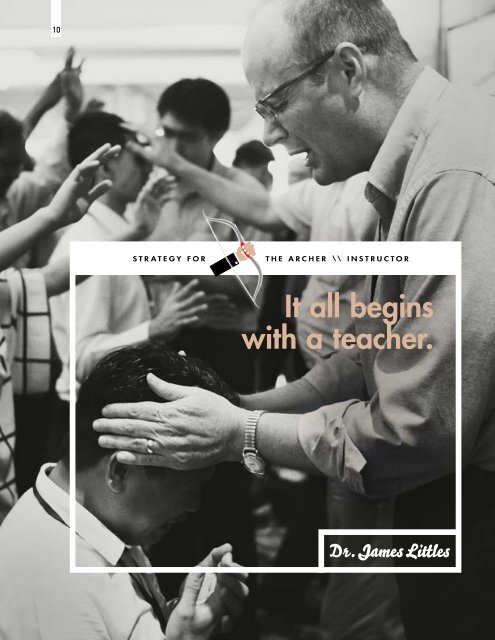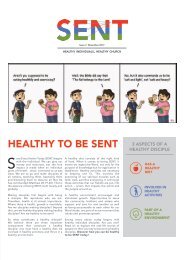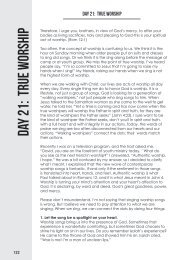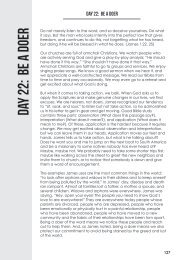Create successful ePaper yourself
Turn your PDF publications into a flip-book with our unique Google optimized e-Paper software.
10<br />
10<br />
STRATEGY FOR<br />
THE ARCHER \\ INSTRUCTOR<br />
It all begins<br />
with a teacher.<br />
Dr. James Littles<br />
KNOW<br />
YOUR<br />
MATERIAL<br />
&<br />
YOUR<br />
STUDENTS<br />
Paul included teachers<br />
in the Ephesians<br />
4 ministry list. The<br />
apostle also clearly<br />
identified the reason<br />
God gifted His people with<br />
these specific ministries. We<br />
should not be surprised to see<br />
the ministries listed as servants<br />
to the church since Jesus had already clearly<br />
identified servant leadership as the only model<br />
accepted in His Kingdom (see Luke 22:24-27).<br />
To faithfully fulfill the mandate to perfect the<br />
saints, prepare them for the work of ministry,<br />
and edify the body of Christ, teachers must proactively<br />
get to know their students.<br />
In his classic preaching textbook, Between<br />
Two Worlds, John Stott suggests preachers<br />
must be able to understand both the Bible and<br />
the cultural context of their audience.<br />
PI instructors can further extend this exegetical<br />
work by studying their students. As Apostolics<br />
we stand on the shoulders of our ministry<br />
forefathers and mothers who were committed<br />
to faithfully studying and obeying the Word.<br />
The powerful rediscovery of Jesus name<br />
baptism, the new birth, a life of holiness, and<br />
a call to make disciples in all the world sprang<br />
from this commitment in the last century.<br />
As we find ourselves in the strange new world<br />
of the 21st century, we have begun the new<br />
work of reexamining our context in a way very<br />
similar to a missionary going to a completely<br />
different culture. This is necessary because our<br />
neighborhoods, cities, and home nations have<br />
become more and more foreign to us.<br />
PI instructors must go one step further. Instructors<br />
are chosen for their love of the Word<br />
and passion for ministry in our current world.<br />
This same commitment must extend to knowledge<br />
of the PI students.<br />
Since teaching is about change in the student,<br />
the primary focus is on student learning<br />
and application rather than on the instructor’s<br />
grasp of the material and skill in dispensing the<br />
material to the class.<br />
Knowledge and ability to share the material<br />
are necessary, but not sufficient in helping PI<br />
students achieve their learning objectives.<br />
Studying PI students requires both a commitment<br />
and a variety of strategies.<br />
Obviously instructors will<br />
engage in praying for students<br />
as a class, as well as for individual<br />
ministers in development.<br />
Times of prayer can provide insights<br />
into student needs.<br />
Secondly, instructors can<br />
further develop their listening<br />
skills. As Neil Pembroke explains in The Art<br />
of Listening, we must provide both availability<br />
and confirmability to really listen. Availability requires<br />
both time and spiritual/emotional space<br />
to focus on the needs of the student. Confirmability<br />
applies the spiritual gift of seeing God’s<br />
purpose and potential in the life of the student<br />
while they may not even be aware of those divine<br />
realities.<br />
Another strategy in learning about the PI student<br />
is attending to questions and answers during<br />
class discussions.<br />
Rather than just making sure the facts from<br />
the lesson are understood, discussions are<br />
wonderful times to learn about the students’<br />
hopes, fears, confusions, successes, failures,<br />
etc. In a similar way instructors can craft assignments<br />
so that students are required to reflect<br />
on and apply the material rather than just repeat<br />
what they have heard and read.<br />
A final readily accessible tool in learning<br />
about the students is to observe them in their<br />
interactions with the instructor, peers, and people<br />
they serve.<br />
PI instructors will find their teaching enriched<br />
and their joy in serving increased by studying<br />
their students. Instructors will learn much about<br />
their spiritual health, cognitive abilities in applying<br />
the material, commitment to valuing and<br />
being transformed by the Word, and success in<br />
transferring classroom material into real ministry<br />
practice. Each of these areas of knowledge<br />
will assist the instructor in both mentoring ministers<br />
in training and modeling biblical truths to<br />
those same students.<br />
Finally, preparation for the class will be more<br />
intentionally focused on the students God has<br />
brought into the instructor’s sphere of influence,<br />
rather than seeing them as glass jars<br />
ready to receive the wisdom we pour out in each<br />
session.<br />
11

















